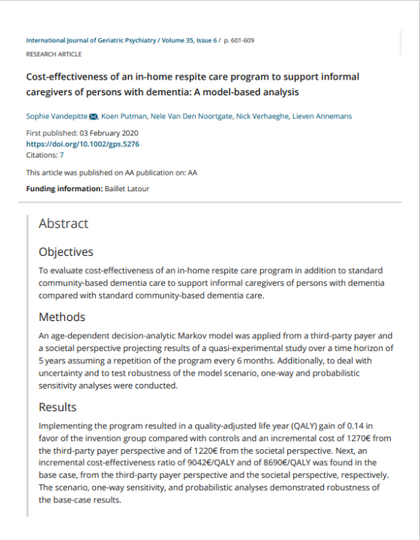Cost-effectiveness of an in-home respite care program to support informal caregivers of persons with dementia: A model-based analysis
The objective of this research is to evaluate cost-effectiveness of an in-home respite care program in addition to standard community-based dementia care to support informal caregivers of persons with dementia compared with standard community-based dementia care.
Author: Sophie Vandepitte, Koen Putman, Nele Van Den Noortgate, Nick Verhaeghe, Lieven Annemans
Publication Date: February 3, 2020
Description:
Objectives: To evaluate cost-effectiveness of an in-home respite care program in addition to standard community-based dementia care to support informal caregivers of persons with dementia compared with standard community-based dementia care.
Methods: An age-dependent decision-analytic Markov model was applied from a third-party payer and a societal perspective projecting results of a quasi-experimental study over a time horizon of 5 years assuming a repetition of the program every 6 months. Additionally, to deal with uncertainty and to test robustness of the model scenario, one-way and probabilistic sensitivity analyses were conducted.
Conclusion: This cost-effectiveness analysis suggests that an in-home respite care program in addition to standard community-based dementia care is a cost-effective approach compared with standard community-based dementia care only. These findings provide more insight into the value of such services for the patient, the caregiver, and for society.
Access: To read this article in full you will need to make a payment or have access to a university database
Keywords: cost-effectiveness, dementia, informal care, in-home respite care



